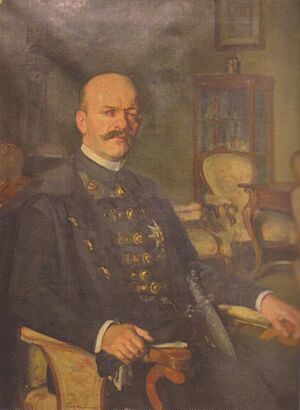Béla Jankovich facts for kids
Quick facts for kids
Béla Jankovich
|
|
|---|---|
 |
|
| Minister of Religion and Education of Hungary | |
| In office 26 February 1913 – 15 June 1917 |
|
| Preceded by | János Zichy |
| Succeeded by | Albert Apponyi |
| Personal details | |
| Born | 29 April 1865 Pest, Kingdom of Hungary |
| Died | 5 August 1939 (aged 74) Budapest, Kingdom of Hungary |
| Political party | Party of National Work |
| Profession | politician, economist |
Béla Jankovich de Vadas et Jeszenicze (born April 29, 1865 – died August 5, 1939) was an important Hungarian politician. He served as the Minister of Religion and Education for Hungary between 1913 and 1917. This role meant he was in charge of schools and religious matters for the whole country.
Contents
Early Life and Global Adventures
Béla Jankovich was born in Pest, which is now part of Budapest, Hungary. He was a very smart student and studied at several famous universities. He attended the Theresianum in Vienna, the University of Budapest, University College London in England, and the Albert Ludwig University of Freiburg in Germany.
After finishing his studies, he decided to see the world! Between 1891 and 1893, he traveled all over. He visited the United States, China, and Japan. Imagine traveling to all those places without modern airplanes! When he returned home, he worked on his family's farm in a place called Tésa.
Becoming a Hungarian Politician
In 1910, Béla Jankovich decided to enter politics. He became a member of the House of Representatives, which is like a parliament or congress where laws are made. He was part of a group called the Party of National Work.
From 1911 to 1913, he held an important position as the second deputy speaker of the House of Representatives. This meant he helped lead the discussions and debates in the parliament. In 1912, he was given the title of privy councilor, which was a special honor given to trusted advisors of the government.
Just before becoming a minister, he worked briefly as a state secretary in the Ministry of Religion and Education. Then, on February 26, 1913, László Lukács, who was the Prime Minister, chose him to be the Minister of Religion and Education. Jankovich stayed in this powerful job until the government, led by István Tisza, resigned in 1917.
Big Changes in Education
Béla Jankovich is remembered for making many important changes to Hungary's education system. He worked on these reforms even though it was a difficult time, with the First World War happening and economic problems.
Improving Schools for Everyone
He introduced new laws that helped organize and improve all kinds of schools. This included state schools, religious schools, and even private schools. He made sure they all had clear rules and standards.
One of his biggest achievements was making education more widely available. He worked to expand free education, so more children could go to school without their families having to pay.
School Councils and Compulsory Education
To make sure schools were working well, he created school councils. These councils helped check how effective the teaching was and made sure students were attending classes regularly. He also supported compulsory education, meaning children had to go to school for a certain number of years.
Science and Religious Recognition
Jankovich's ministry also focused on improving secondary schools. They organized these schools to have a special focus on science, helping students learn more about important scientific subjects.
He also made sure that the Islamic religion was officially recognized by law in Hungary. This was an important step for religious freedom.
Economist and Scholar
Besides being a politician, Béla Jankovich was also a talented economist. He was one of the first people to use mathematical methods to analyze economic situations. This was a new and advanced way to understand how money and trade worked. Because of his knowledge and contributions, he became a corresponding member of the Hungarian Academy of Sciences. This is a special honor given to top scholars and scientists.

